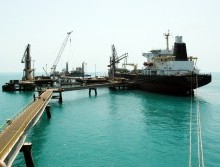
ISIS has lost a key part of their oil business, thanks to US special ops. Oil Tanker. Illustrative. Photo Courtesy of U.S. Navy. Photo by Mass Communication 2nd Class Nathan Schaeffer
The US has officially taken the fight against ISIS inside Syria from the air to the ground and in the process took down a key player in ISIS’ financial efforts. American special forces last week targeted and ultimately killed ISIS senior leader Abu Sayyaf, who was involved in both military operations and “helped direct the terrorist organization’s illicit oil, gas, and financial operations,” according to a statement from Secretary of Defense Ash Carter posted Saturday on the Pentagon website.
Sayyaf was killed in the operation after he attacked US forces, but the Americans did not suffer any casualties or injuries. Sayyaf’s wife, Umm—herself a suspected of “playing an important role” in ISIS’ terrorism—was captured. CNN reported that a US official said the oil and gas funds are a “key source of revenue” for ISIS, also known as ISIL.
“The operation represents another significant blow to ISIL, and it is a reminder that the United States will never waver in denying safe haven to terrorists who threaten our citizens, and those of our friends and allies,” said Carter in the Pentagon statement on Saturday.
The strike, which compliments months’ worth of bombing runs targeting ISIS in Syria and Iraq, comes as American officials called discussions with Turkey on cooperation in the fight with ISIS “productive.” Today’s Zaman reported that the comment came in a statement of the US Embassy to Turkey, which also highlighted the expectations of the program set to train moderate Syrians in Turkey to join the battle with ISIS.
The statement said that US Special Presidential Envoy General John Allen told the Turks the program will “build the capability of the vetted Syrian opposition to defend the Syrian people from attacks” by ISIS.
However, General Allen’s comments implied the Syrian trainees will do more than just help the US fight ISIS, as ISIS is part of the multi-front civil war tearing Syria apart. Battling ISIS, therefore, also could help the moderates in Syria make gains in that war.
General Allen included in his list of expectations for that trainees that they would “secure territory controlled by the moderate Syrian opposition… and promote the conditions for a negotiated settlement to end the conflict in Syria.”
(By Joshua Spurlock, www.themideastupdate.com, May 17, 2015)
